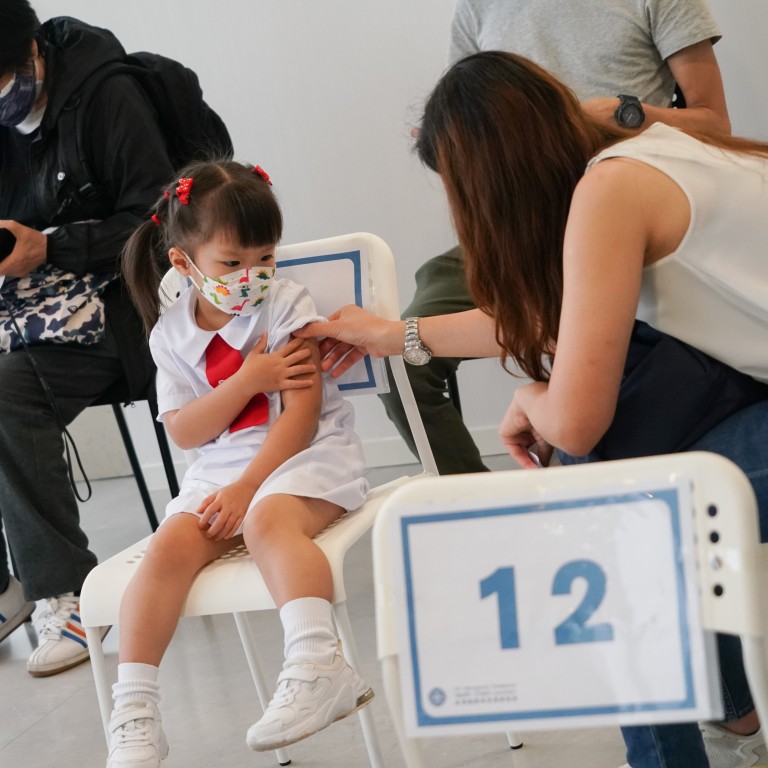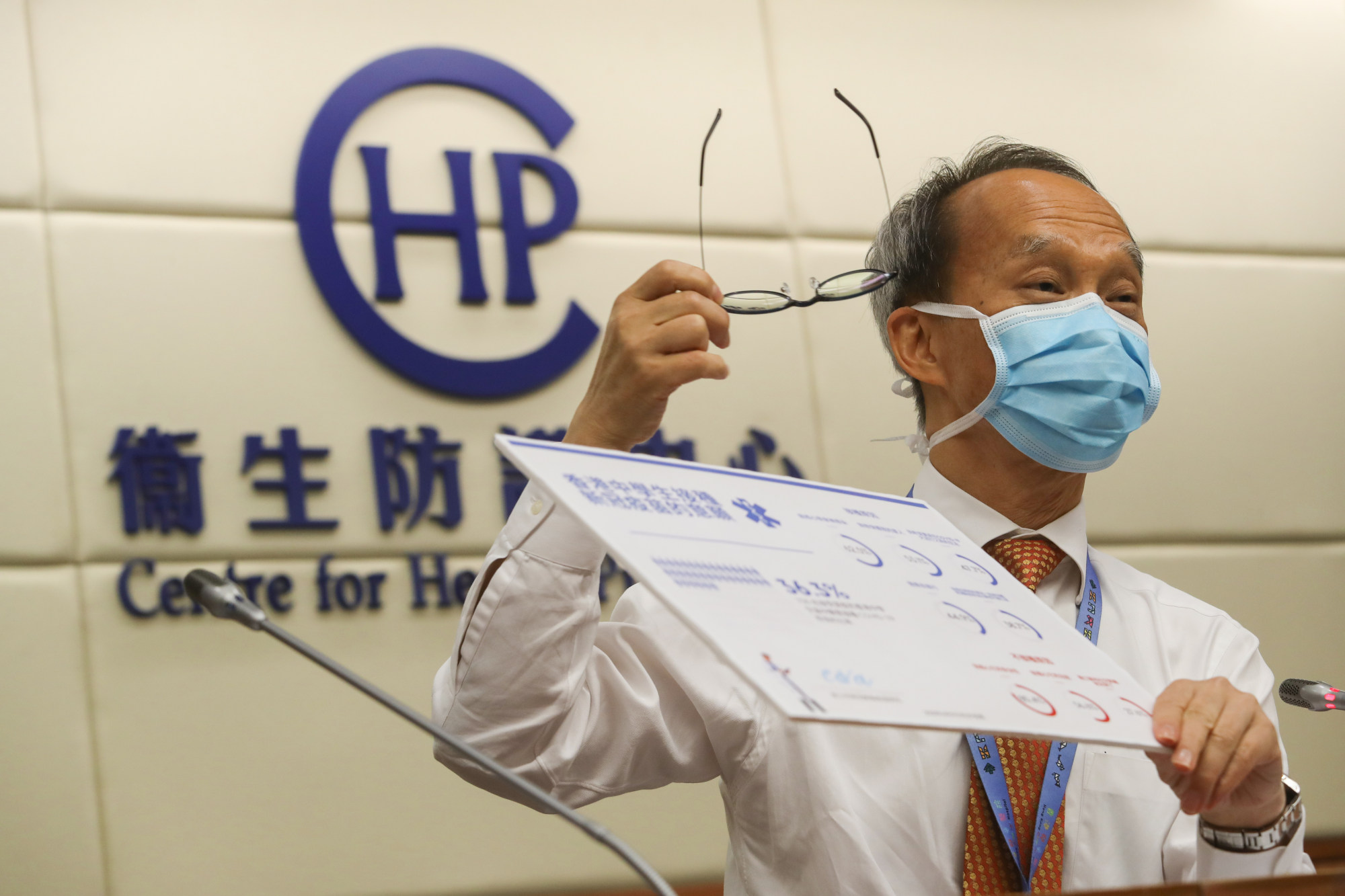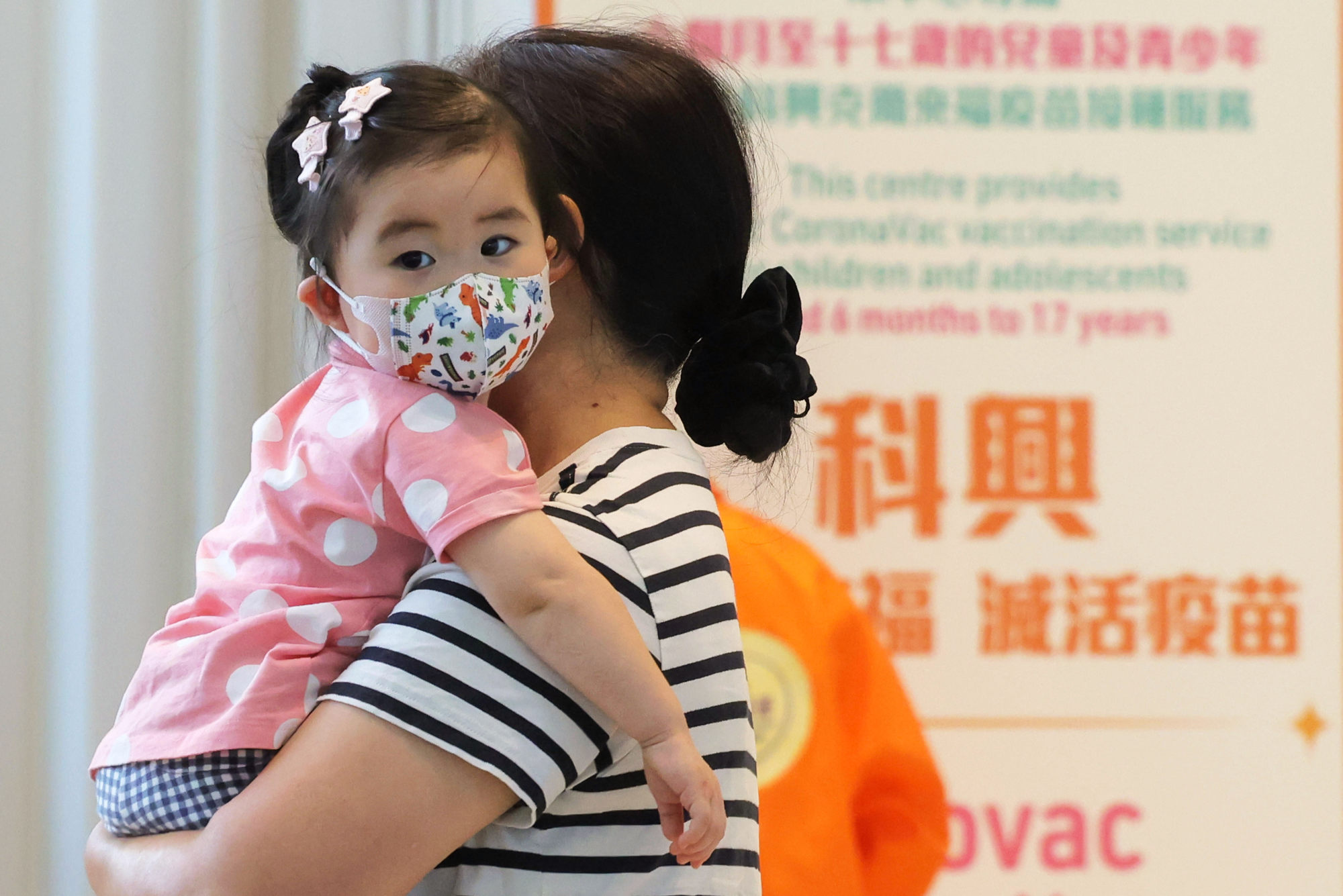
Coronavirus: Hong Kong reviews proposal to give children mix of BioNTech and Sinovac jabs, but experts urge parents to inoculate kids with already available shots
- Authorities confirm Post report, with health minister Lo Chung-mau and scientific committee to review application to make available BioNTech jab for youngsters
- Health experts say recommendation to mix Chinese and German-made jabs is also under review, but urge parents to inoculate kids with Sinovac shots for now
Hong Kong will review recommendations on whether to inoculate children against Covid-19 with a mix of the BioNTech and Sinovac vaccines, but experts have urged parents to make bookings for the latter now to quickly boost protection.
Confirming an earlier report by the Post, authorities on Tuesday night also said Secretary for Health Lo Chung-mau and an expert committee were examining an application to authorise the use of a BioNTech vaccine suitable for children aged six months to three years.
Professor Lau Yu-lung, who chairs the Scientific Committee on Vaccine Preventable Diseases, on Wednesday said the German-made shot could be available for children as early as next month, but told parents not to wait and inoculate their children with the Chinese-made Sinovac one.
BioNTech vaccine for children may be available in Hong Kong as early as October
“Time is of the essence when it comes to getting the protection afforded from a basic double vaccination, both jabs as we know are effective against severe diseases and deaths from Covid-19,” he said.
Hong Kong reported a slight uptick in daily coronavirus cases on Wednesday, after recording a downward trend for the past week, with health officials logging 5,687 infections, 146 of which were imported, and nine more related deaths.
The city’s overall tally stands at 1,725,036 cases and 9,917 related fatalities.
Lau said the quickest way to protect children from Covid-19 was to give them two jabs of the already available Sinovac vaccine.
He explained that first and second Sinovac shots only needed to be administered one month apart, while the BioNTech vaccine had a recommended interval of two months.

Government pandemic adviser Professor David Hui Shu-cheong said officials would review evidence on whether children already inoculated with the Sinovac jab could take the BioNTech one for their second dose, and provide a recommendation later, which would include a suggested interval period between taking the two shots.
“Unfortunately there is no data around the world on such mixed dosages for this age group,” Hui said, pointing out that only a few countries had lowered the age threshold for vaccination, including the United States and Israel.
Hong Kong approves Sinovac jab for toddlers as officials seek BioNTech formula
Dr Joseph Tsang Kay-yan, a private specialist and chairman of the Medical Association’s advisory committee on communicable diseases, said the possibility of mixing vaccines was on many parents’ minds after news broke that the children’s version of the BioNTech jab was on the way.
“It is difficult to derive from adults’ experiences and data to form a view on mixing vaccines, as the immunity response triggered could vary after the dosage level is changed for children,” he said.
Professor Ivan Hung Fan-ngai, a top infectious disease expert and convenor of a government vaccine committee, meanwhile expressed his personal view that children aged between six months and five years who had received the Sinovac shots should not be inoculated with a second or third dose of BioNTech.
He explained that there was no data on the safety and efficacy of switching the vaccines for children as young as six months.

It might be safe for these children to receive another brand of vaccine after getting three initial doses, he added, but more scientific data would be needed.
“Overall, both [BioNTech and Sinovac] vaccines appear to be very safe,” he noted, adding that there was no data showing that the protection offered by either differed.
A two-year-old boy with Covid-19, who was admitted to United Christian Hospital’s intensive care unit on Tuesday, remains critically ill, according to the Hospital Authority.
Dr Gladys Kwan, a chief manager with the authority, moved to dispel online rumours that the severity of his illness was caused by vaccination.
“Serious complications are caused by high viral load after contracting the coronavirus, and has nothing to do with vaccination,” she said. “We hope parents understand vaccination is very safe, and should arrange for their children to get inoculated as soon as possible to minimise the risk of death and serious complications after infection.”
Government adviser Lau also addressed the medical inaccuracies presented in the rumour, which he said was circulating in social media forums visited by parents. He described claims of inoculation leading the boy to develop cytokine storm, a condition that triggers aggressive immune responses, as “inaccurate” and “rubbing salt into the wound”.
‘70 per cent of hospital beds for children with Covid already full in Hong Kong’
“Some parents, who refuse to vaccinate their children, are promoting their own viewpoints online, spreading misinformation with inaccurate evidence,” he said. “It’s fine if this parent [who wrote the forum post] is against vaccination for children but why do they have to rub salt into others’ wounds?”
He stressed that since the Sinovac vaccine was an inactivated one, which consist of killed viruses, it would not result in further virus reproduction in the human body.
In a separate development, the government announced that it will open bookings for monkeypox vaccination on October 3 and begin inoculation two days later, after one imported case was recorded.
Authorities earlier urged high-risk individuals, including people with multiple sex partners and sex workers, to get vaccinated on a voluntary basis.

